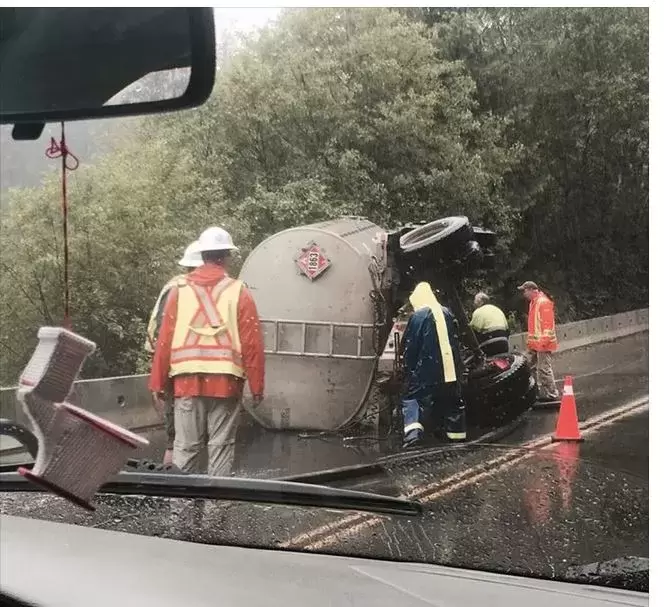More than six months after an aviation fuel spill that shut down Tofino highway for 24 hours, floating berms and equipment remain at the now cleaned site, leading travelers to wonder if Kennedy Lake is still contaminated.
On June 15, 2017 a tanker hauling Jet A fuel overturned east of Ucluelet, puncturing its tank and leaking an estimated 3,000 litres of fuel into the lake. The area was closed for 24 hours as emergency responders and government officials dealt with the mess.
Tla-o-qui-aht First Nation (TFN) has invested much time and energy into restoring and protecting Ha?ukmin Tribal Park, through which Highway 4 West travels. Ha?ukmin means feast bowl to the Tla-o-qui-aht. It is a place the Tla-o-qui-aht of past generations relied on to sustain their people. Today’s generation is working to restore it to its previous state of abundance. Part of that work is to ensure the waters of Kennedy Lake stay clean.
Immediately following the accident Tla-o-qui-aht’s Natural Resources Manager Saya Masso said some of their people attempted to get to the site to assess the damage but were prevented from doing so by emergency personnel. It was later revealed that the area was filled with noxious fumes and emergency responders were required to wear protective gear and respirators.
As required by law, the party responsible for the spill is obligated to manage the clean-up. The culprit contracted Terra West to handle the situation. They collected soil and surface water samples and report there was minimal surface sheen observed on the lake at the time following the clean-up.
Six months later, clean up equipment is still visible at the site. There are metal drums near the water’s edge and a floating boom surrounds an area of water encompassing the spill zone.
When asked if the area is still contaminated, Masso told Ha-Shilth-Sa that TFN Guardians have been participating in long-term monitoring at the spill site.
“We have had a cooperative relationship with the company that spilled the fuel,” he added. “The booms that are floating in the water are in the lake at TFN request to remain for the long term monitoring program.”
The floating booms remain in place as a safety measure while the nation ensures there is no leaching of fuel during the rainy seasons.
“There have not been any signs of further leeching over the winter rains so far,” said Masso.
Canada Air Crane and the environmental firm Terra West have been open and collaborative on the site and remediation plan. Masso estimates that the monitoring will continue for another couple of months, until the rainy season is over.
Terra West could not be reached for comment.







